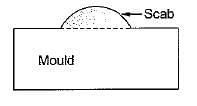Mechanical Engineering Exam > Mechanical Engineering Questions > Scab is aa)sand casting defectb)machining def...
Start Learning for Free
Scab is a
- a)sand casting defect
- b)machining defect
- c)welding defect
- d)forging defect
Correct answer is option 'A'. Can you explain this answer?
| FREE This question is part of | Download PDF Attempt this Test |
Verified Answer
Scab is aa)sand casting defectb)machining defectc)welding defectd)forg...
Scab is sand casting defect caused due to improper ramming of moulding sand.


Most Upvoted Answer
Scab is aa)sand casting defectb)machining defectc)welding defectd)forg...
Scab is a sand casting defect. Sand casting is a popular and widely used casting process in which molten metal is poured into a mold cavity formed in a sand mold. During the solidification of the metal, various defects can occur, and one of these defects is a scab.
Scab is a defect that occurs on the surface of a casting and is characterized by a raised or rough area. It is caused by the detachment of a thin layer of sand from the mold surface during the pouring of the molten metal. The detached sand then becomes embedded in the casting, resulting in a scab.
There are several reasons why scabs may occur in sand casting:
1. Mold Material: The quality and properties of the mold material can influence the occurrence of scabs. If the mold material is not properly prepared or if it contains impurities, it may not bond properly with the molten metal, leading to scab formation.
2. Mold Design: The design of the mold can also contribute to scab formation. If there are sharp corners or edges in the mold cavity, the molten metal may not flow smoothly, causing turbulence and sand detachment.
3. Pouring Technique: The way the molten metal is poured into the mold can affect the occurrence of scabs. If the pouring is done too fast or too forcefully, it can create turbulence and dislodge sand particles, leading to scab formation.
4. Metal Temperature: The temperature of the molten metal can also play a role in scab formation. If the metal temperature is too high, it can cause rapid sand expansion and detachment from the mold surface.
To prevent scab defects in sand casting, several measures can be taken:
- Use high-quality mold materials that are properly prepared and free from impurities.
- Design the mold with smooth and rounded corners to promote smooth metal flow.
- Control the pouring technique to ensure a smooth and controlled flow of molten metal.
- Monitor and control the metal temperature to prevent excessive sand expansion.
By implementing these measures, the occurrence of scab defects in sand casting can be minimized, resulting in higher quality castings.
Scab is a defect that occurs on the surface of a casting and is characterized by a raised or rough area. It is caused by the detachment of a thin layer of sand from the mold surface during the pouring of the molten metal. The detached sand then becomes embedded in the casting, resulting in a scab.
There are several reasons why scabs may occur in sand casting:
1. Mold Material: The quality and properties of the mold material can influence the occurrence of scabs. If the mold material is not properly prepared or if it contains impurities, it may not bond properly with the molten metal, leading to scab formation.
2. Mold Design: The design of the mold can also contribute to scab formation. If there are sharp corners or edges in the mold cavity, the molten metal may not flow smoothly, causing turbulence and sand detachment.
3. Pouring Technique: The way the molten metal is poured into the mold can affect the occurrence of scabs. If the pouring is done too fast or too forcefully, it can create turbulence and dislodge sand particles, leading to scab formation.
4. Metal Temperature: The temperature of the molten metal can also play a role in scab formation. If the metal temperature is too high, it can cause rapid sand expansion and detachment from the mold surface.
To prevent scab defects in sand casting, several measures can be taken:
- Use high-quality mold materials that are properly prepared and free from impurities.
- Design the mold with smooth and rounded corners to promote smooth metal flow.
- Control the pouring technique to ensure a smooth and controlled flow of molten metal.
- Monitor and control the metal temperature to prevent excessive sand expansion.
By implementing these measures, the occurrence of scab defects in sand casting can be minimized, resulting in higher quality castings.
Attention Mechanical Engineering Students!
To make sure you are not studying endlessly, EduRev has designed Mechanical Engineering study material, with Structured Courses, Videos, & Test Series. Plus get personalized analysis, doubt solving and improvement plans to achieve a great score in Mechanical Engineering.

|
Explore Courses for Mechanical Engineering exam
|

|
Similar Mechanical Engineering Doubts
Scab is aa)sand casting defectb)machining defectc)welding defectd)forging defectCorrect answer is option 'A'. Can you explain this answer?
Question Description
Scab is aa)sand casting defectb)machining defectc)welding defectd)forging defectCorrect answer is option 'A'. Can you explain this answer? for Mechanical Engineering 2024 is part of Mechanical Engineering preparation. The Question and answers have been prepared according to the Mechanical Engineering exam syllabus. Information about Scab is aa)sand casting defectb)machining defectc)welding defectd)forging defectCorrect answer is option 'A'. Can you explain this answer? covers all topics & solutions for Mechanical Engineering 2024 Exam. Find important definitions, questions, meanings, examples, exercises and tests below for Scab is aa)sand casting defectb)machining defectc)welding defectd)forging defectCorrect answer is option 'A'. Can you explain this answer?.
Scab is aa)sand casting defectb)machining defectc)welding defectd)forging defectCorrect answer is option 'A'. Can you explain this answer? for Mechanical Engineering 2024 is part of Mechanical Engineering preparation. The Question and answers have been prepared according to the Mechanical Engineering exam syllabus. Information about Scab is aa)sand casting defectb)machining defectc)welding defectd)forging defectCorrect answer is option 'A'. Can you explain this answer? covers all topics & solutions for Mechanical Engineering 2024 Exam. Find important definitions, questions, meanings, examples, exercises and tests below for Scab is aa)sand casting defectb)machining defectc)welding defectd)forging defectCorrect answer is option 'A'. Can you explain this answer?.
Solutions for Scab is aa)sand casting defectb)machining defectc)welding defectd)forging defectCorrect answer is option 'A'. Can you explain this answer? in English & in Hindi are available as part of our courses for Mechanical Engineering.
Download more important topics, notes, lectures and mock test series for Mechanical Engineering Exam by signing up for free.
Here you can find the meaning of Scab is aa)sand casting defectb)machining defectc)welding defectd)forging defectCorrect answer is option 'A'. Can you explain this answer? defined & explained in the simplest way possible. Besides giving the explanation of
Scab is aa)sand casting defectb)machining defectc)welding defectd)forging defectCorrect answer is option 'A'. Can you explain this answer?, a detailed solution for Scab is aa)sand casting defectb)machining defectc)welding defectd)forging defectCorrect answer is option 'A'. Can you explain this answer? has been provided alongside types of Scab is aa)sand casting defectb)machining defectc)welding defectd)forging defectCorrect answer is option 'A'. Can you explain this answer? theory, EduRev gives you an
ample number of questions to practice Scab is aa)sand casting defectb)machining defectc)welding defectd)forging defectCorrect answer is option 'A'. Can you explain this answer? tests, examples and also practice Mechanical Engineering tests.

|
Explore Courses for Mechanical Engineering exam
|

|
Suggested Free Tests
Signup for Free!
Signup to see your scores go up within 7 days! Learn & Practice with 1000+ FREE Notes, Videos & Tests.
























